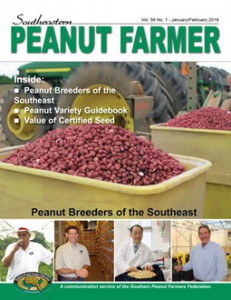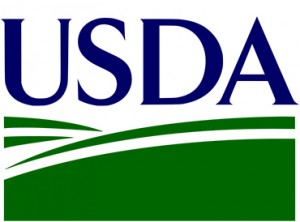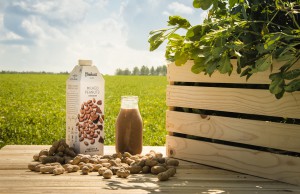
Mississippi Peanut Growers Association members had the opportunity to visit with industry representatives during the MPGA annual meeting and trade show held Jan. 31 – Feb. 1, 2018, at the Lake Terrace Convention Center in Hattiesburg, Miss. Pictured left to right: Keith Driscoll, Grand Bay, Ala., Charles Haubold, sales representative with Teva Corporation, and Bud Seward, Lucedale, Miss.
The Mississippi Peanut Growers Association held its annual meeting and trade show Jan. 31-Feb. 1. 2018, at the Lake Terrace Convention Center, Hattiesburg, Mississippi. Throughout the course of the event, more than 175 growers and industry representatives had the opportunity to hear from peanut industry leaders, university specialists and visit with more than 35 agribusinesses during an exhibit trade show.
The annual meeting kicked off on Jan. 31 with a legislative update and status on the 2018 Farm Bill from Bob Redding of the Redding Firm in Washington, D.C. MPGA members received an update on the promotional activities and financial report of MPGA from Malcolm Broome, MPGA executive director, and Lonnie Fortner, chairman of the Mississippi Peanut Promotion Board. Members also received an update on the activities of the Southern Peanut Growers from Leslie Wagner, executive director of SPG.
The association held its annual meeting where Mississippi peanut growers elected MPGA board members. The MPGA board members elected include the following: Joe Morgan, district one representative and president, Hattiesburg; Lonnie Fortner, district two representative and vice president, Port Gibson; Alan Atkins, district three representative, Hamilton; Patrick Martin, district four representative, Greenwood; and members at large Scott Flowers, Clarksdale; Van Hensarling, Richton; and B. Jones, Yazoo City.
During day two, attendees heard from multiple Mississippi State faculty members and industry experts. Mike McCormick, president of Mississippi Farm Bureau, provided a policy update, while Ryan Lepicier, senior vice president of National Peanut Board, presented an overview of current NPB activities.
Mississippi State University factulty presented a report on the various research projects involving peanuts. Jason Sarver, MSU peanut agronomist, discussed production practices and variety trial research results in Mississippi. Growers also received updates on insect and disease management from Jeff Gore, MSU entomologist, and Alan Henn, MSU plant pathologist. Chad Abbott, MSU research extension associate, provided results of 2017 on-farm growth regulator in Mississippi.
Attendees also received an overview of peanut digging efficiency and effects on yield from Kendall Kirk, precision ag engineer at Clemson University, a 2018 market outlook from Marshall Lamb, director of the USDA ARS National Peanut Research Lab.
The two-day meeting concluded with door prize drawings from several businesses and organizations including Kelley Manufacturing Co. and Amadas Industries. Baylor Travis, Tchula, Mississippi, received the Grand Door Prize of one season’s use of a new KMC peanut combine and Crystal Mahalitc, Vicksburg, Mississippi, received one season’s use of a Amadas four-row or six-row peanut inverter or certificate towards the purchase of a new Amadas self-propelled peanut combine or pull-type peanut combine.
For more information on MPGA, visit www.misspeanuts.com.










